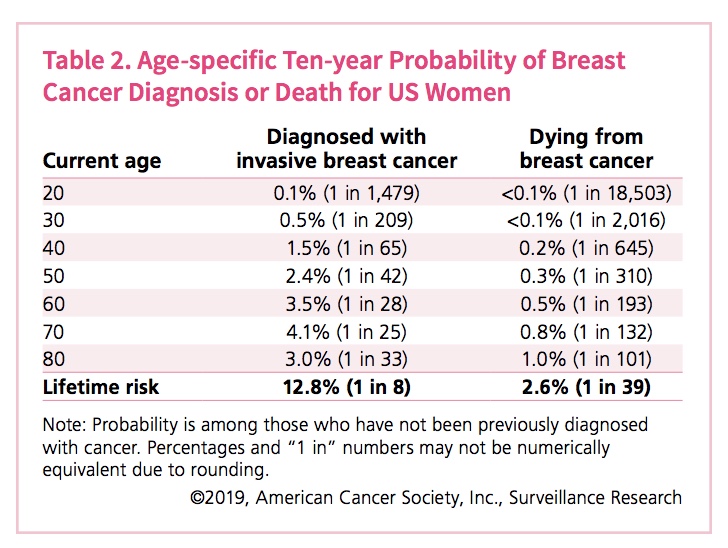Many people think of breast cancer as only affecting older women, but almost every week we evaluate a young woman who’s been diagnosed. According to the American Cancer Society, in 2019 an estimated 268,800 people will be diagnosed with breast cancer (1). About 10% of these will be diagnosed under the age of 45 (2).
Young women with breast cancer face unique challenges. Women under 40 are more often than older women to be diagnosed with more aggressive forms of breast cancer, at later stages, with higher chances of it spreading to the lymph nodesSmall, bean-shaped collections of immune tissue that filter out cell fluid and bacteria that may be circulating in the body. They help fight infections and play a role in fighting cancer.. Younger women’s tumors are more likely to be a larger size and a higher grade. And women under 40 are more likely to die than older women, even if diagnosed with Stage I or Stage II breast cancers (3). Many have to balance fertility issues and body image concerns. And the financial impact of cancer treatment can be especially taxing on young families.
At What Age Can You Get Breast Cancer?
Getting older is a risk factor for breast cancer and most women who are diagnosed with breast cancer are 50 years or older (4). While it is not common for young women to be diagnosed, it is possible. The American Cancer Society reports the risk of being diagnosed with breast cancer by decade (1):

What is Your Risk of Getting Breast Cancer?
Even as a young woman it is important to understand your risk of breast cancer. Regardless of age, multiple risk factorsAnything that increases or decreases a person’s chance of developing a disease. can impact your lifetime risk of developing breast cancer:
- family history
- personal medical history
- breast density
- BRCA gene mutation
- Ashkenazi Jewish descent
- obesity
- sedentary lifestyle
- alcohol use
- tobacco
- hormonal factors
Risk can also be related to the amount of time your breast tissue is consistently exposed to estrogen, as it is during long periods of uninterrupted menstrual or ovulatory cycles. In addition, if you’ve undergone a breast tissue biopsyThe removal and examination of tissue from a living body to discover the presence, cause, or extent of a disease., receiving abnormal results or results that show changes in your breasts could increase your risk.
Breast density, in particular, is a risk factor that young women should be aware of. Young women are more likely to have dense breasts and women with dense breasts have a 79% increased risk of being diagnosed with breast cancer (5). Dense breasts also make mammograms difficult to interpret and could reduce your chances of early detection.
Do Young Women Get a Certain Type of Breast Cancer?
Young women, like all women, can be diagnosed with any type of cancer, but an aggressive type of cancer called triple-negative breast cancer is seen more commonly in younger women.
Triple-negative breast cancer not only progresses faster, but it is harder to treat. Up until 2018, chemotherapyTreatment with drugs to destroy or slow down the growth of cancer cells. Often referred to as systematic treatment, because it acts throughout the body, as opposed to localized treatments, like surgery or radiation. was the only treatment option available. In 2018 a medication called “olaparib,” a PARP-inhibitor, was approved. It can treat those with the BRCA geneA sequence in the DNA which can be passed down from parent to child. Genes helps determine physical and functional traits for the body. mutation, which include some patients with triple-negative breast cancer. The FDA has also granted accelerated approval to an immunotherapy drug called “atezolizumab” which may help triple-negative breast cancer patients that have the PD1 marker.
At NYU Winthrop, we are currently working on developing tests capable of predicting a specific patient’s response to preoperative chemotherapy treatment. Our goal is to create new treatments which are personalized, more effective and extend survival.
Early Detection For Young Women
Early detection can be quite challenging for young women. Not only do women undergo substantial breast changes in their 20s and 30s from motherhood and breastfeeding, but most do not begin mammogramsA low dose x-ray picture of the breast that allows a doctor to view glandular tissue and determine the presence of cancer. until 40 years old or even later. For those that do begin mammograms before 40, they have the additional challenge of dense breasts which can cause questions in mammogram interpretation. Most women, even those at average risk and with dense breasts, should get an annual mammogram starting at 40.
It’s important to develop an individualized screening plan based on your individual risk factors. If you have a higher risk level because of family or personal history or lifestyle risk factors, we recommend talking to your doctor about a custom early detection plan around the age of 25. Remember it is never too early to begin breast self-exams and it is never too early to be proactive with your health.
This article was written with the expertise and generous assistance of Medical Advisory Council member Dr. Douglas Marks.
Sources
- Breast Cancer Facts & Figures 2019-2020, American Cancer Society
- Risk Factors for Breast Cancer at a Young Age, Centers For Disease Control & Prevention (CDC)
- “Elevated Breast Cancer Mortality in Young Women (<40 Years) Compared with Older Women Is Attributed to Poorer Survival in Early Stage Disease,” Journal of the American College of Surgeons, 2012
- What Are The Risk Factors For Breast Cancer,” Centers For Disease Control & Prevention (CDC)
- “Breast Density and Parenchymal Patterns as Markers of Breast Cancer Risk: A Meta-analysis,” Cancer Epidemiology BiomarkersA distinct biochemical, genetic, or molecular characteristic or substance that is an indicator of a particular biological condition or process. & Prevention, 2006
Featured Image courtesy of Dept. of Foreign Affairs & Trade, Australia via Flickr